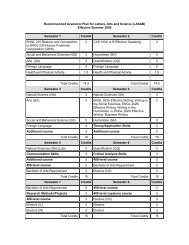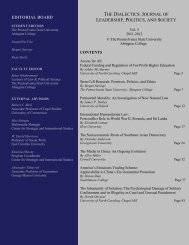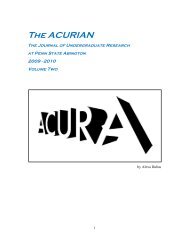Vol. III - Penn State Abington
Vol. III - Penn State Abington
Vol. III - Penn State Abington
You also want an ePaper? Increase the reach of your titles
YUMPU automatically turns print PDFs into web optimized ePapers that Google loves.
FREE EXPRESSION:<br />
MOVING THE EUROPEAN UNION TOWARDS AN AMERICAN MODEL<br />
By Alexander Badas ∗<br />
University of Toledo<br />
Freedom of thought and the freedom to express that thought are fundamental freedoms to<br />
man. Allowing this freedom to be robust and only minimally regulated allows society to develop<br />
more rapidly. There are plenty of theories that support this claim, most notably the public debate<br />
theory and the expressivist theory. As far as creating a legal system that supports these theories,<br />
the United <strong>State</strong>s’ First Amendment should be looked to as a standard. For this reason, the<br />
European Court of Justice should look to the United <strong>State</strong>s’ model while developing its free<br />
expression jurisprudence, for the current system has not been as robust and as free as it should<br />
be.<br />
First, I will examine the various theories that support a robust idea of freedom of<br />
expression. The public debate theory indicates that expression is “an adversarial process whereby<br />
social benefits such as truth and good public policy advance through the constant introduction of<br />
new ideas to compete with established ideas” (Nelson, 2005:31). Therefore, since speech leads to<br />
such benefits as truth or good public policy, expression should be left unregulated. In this theory,<br />
expression works as in a market: once the expression is expressed, it is considered to be in the<br />
marketplace. Considering the content of that expression, it will be improved, disproved, or<br />
simply ignored. I will draw a few examples: Consider the process of creating the Constitution of<br />
the United <strong>State</strong>s. When the Annapolis Convention first met, it was for the purpose of amending<br />
the Articles of Confederation. However, a debate began as to whether amending the Articles of<br />
Confederation would be sufficient in establishing an acceptable government. These debates led<br />
to the decision to adopt a new constitution instead. Then again debate occurred. Noble<br />
expressions such as James Madison’s Virginia Compromise or William Paterson’s New Jersey<br />
Plan were debated and improved and led to the “Great Compromise,” later adopted in the new<br />
Constitution. While other, less noble, or even insidious ideas, such as Alexander Hamilton’s idea<br />
of a monarch-like president, were chiefly ignored or debated briefly and disapproved of quickly.<br />
As this example should show, the public debate theory allows for a market were good ideas<br />
flourish while bad ideas are ignored or quickly countered. Therefore, since bad ideas cannot<br />
survive in the market, there is no reason to legalize them, as the market will correct itself.<br />
However, there are a few objections to the public debate theory of speech. One of those<br />
objections is that some expression undermines public debate. Therefore, since public debate and<br />
truth are the objectives of the public debate theory, those who believe in it will be willing to<br />
accept restrictions on expression that would limit speech that undermines public debate (Nelson,<br />
2005:47). To draw an example, one might believe in outlawing hate speech because it distracts<br />
from the truth and good policy or equality. However, this objection is easily answered. Even<br />
expression that may undermine public debate should be left unregulated because if it were<br />
regulated it would produce a chilling effect or a slippery slope. Considering the latter, that is to<br />
∗ Alexander Badas is a senior at the University of Toledo, majoring in Law, Social<br />
Thought, Political Science, and Philosophy.<br />
THE DIALECTICS ▲ 2009<br />
www.abington.psu.edu/dialectics<br />
51







